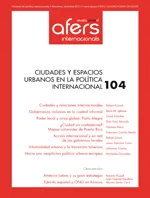Transforming politics of urban informality: the case of Tunisia’s transition

This article addresses the study of the «informal sector» or the «informal economy» in the discourse on development. It asks to what extent, and why, the structure of the informal economy, its prevalence in urban areas and its connection to the socially marginalised justify the claim that the Tunisian uprising of 2010-2011 can be considered an «informal revolution». Drawing on urban sociology and anthropology, the article conceptualises informality in everyday urban life, by linking the impact of globalisation, neoliberal policies and urban governance to the informal economic activity of people from socially-marginalised and spatially-segregated urban areas. To illustrate the argument, the case of the Tunisian uprising in 2010-2011 reveals the changing role of informality and its influence on urban governance of the informal economy and, in particular, on informal trade.
Key words: informal sector, development, city, governance, Tunisia
The full text articles of this issue are available only in Spanish language